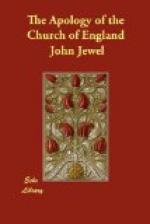For where these men bid the Holy Scriptures away, as dumb and fruitless, and procure us to come to God Himself rather, who speaketh in the Church and in councils, which is to say, to believe their fancies and opinions; this way of finding out the truth is very uncertain and exceeding dangerous, and in manner a fantastical and mad way, and by no means allowed of the holy fathers. Chrysostom saith, “There be many oftentimes which boast themselves of the Holy Ghost; but truly whoso speak of their own head do falsely boast they have the Spirit of God. For like as (saith he) Christ denied He spake of Himself, when He spake out of the law and Prophets, even so now, if anything be pressed upon us in the Name of the Holy Ghost, save the Gospel, we ought not to believe it. For as Christ is the fulfilling of the law and Prophets, so is the Holy Ghost the fulfilling of the Gospel.” Thus far goeth Chrysostom.
PART V.
But here I look they will say, though they have not the Scriptures, yet may chance they have the ancient doctors and the holy fathers with them. For this is a high brag they have ever made, how that all antiquity and a continual consent of all ages doth make on their side; and that all our cases be but new, and yesterday’s work, and until these few late years were never heard of. Questionless, there can nothing be more spitefully spoken against the religion of God than to accuse it of novelty, as a new come up matter. For as there can be no change in God Himself, so ought there to be no change in His religion.
Yet, nevertheless, we wot not by what means, but we have ever seen it come so to pass from the first beginning of all, that as often as God did give but some light, and did open His truth unto men, though the truth were not only of greatest antiquity, but also from everlasting; yet of wicked men and of the adversaries was it called new-fangled and of late devised. That ungracious and bloodthirsty Haman, when he sought to procure the king Assuerus’ displeasure against the Jews, this was his accusation to him: “Thou hast here (saith he) a kind of people that useth certain new laws of their own, but stiff-necked and rebellious against all thy laws.” When Paul also began first to preach and expound the Gospel at Athens he was called a tidings-bringer of new gods, as much to say as of a new religion; “for” (said the Athenians) “may we not know of thee what new doctrine this is?” Celsus likewise, when he of set purpose wrote against Christ, to the end he might more scornfully scoff out the Gospel by the name of novelty: “What!” saith he, “hath God after so many ages now at last and so late bethought Himself?” Eusebius also writeth that Christian religion from the beginning for very spite was called [Greek text], that is to say, new and strange. After like sort, these men condemn all our matters as strange and new; but they will have their own, whatsoever they are, to be praised as things




